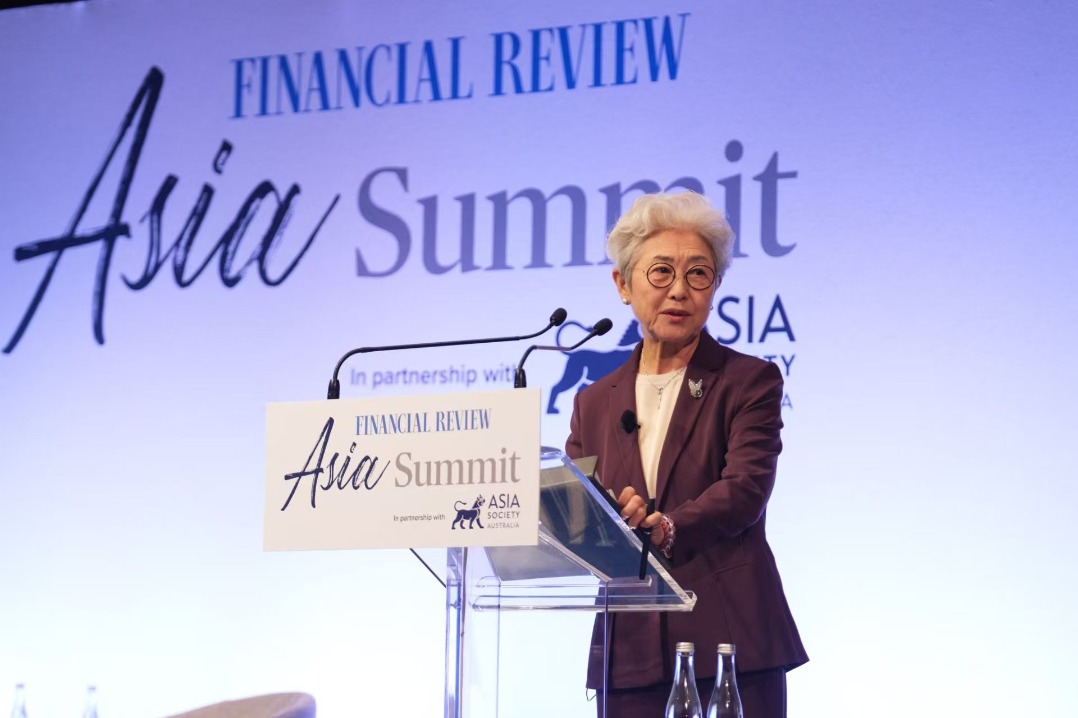Opportunity knocks
Ukraine crisis could lead to fresh progress in the internationalization of the renminbi


Under the current international monetary system, the credibility of the United States Federal Reserve's monetary policy is a source of stability anchoring the global monetary system. Some believe the Fed will put in place a responsible monetary policy to stabilize domestic growth and inflation, which will also bring stability to the exchange rate of the dollar and the price of dollar-safe assets. However, three events-the US subprime mortgage crisis of 2008, the outbreak of the COVID-19 pandemic and Ukraine crisis, have undermined the credibility of the Fed's monetary policy.
After the subprime mortgage crisis broke out, the Fed rolled out three rounds of quantitative easing over a period lasting five to six years to spur economic growth. That increased the Fed's total assets from over $1 trillion to about $4.5 trillion. As a result, a deluge of liquidity has greatly boosted global asset prices, especially the US financial market.
With the onset of the COVID-19 pandemic, the Fed increased its total assets from $4 trillion to $9 trillion through quantitative easing within two years. The academic circle in the US even developed the so-called Modern Money Theory to legitimize the above-mentioned operations.
The most significant fallout of Ukraine crisis is that the US and some European countries have frozen Russia's foreign exchange and gold reserves, ending the safe-haven status of the world's most important safe asset-US Treasury bonds.
For countries that hold a large amount of foreign exchange reserve assets but are not US allies, such as China and India, this means that investing in US Treasury bonds will no longer be safe, as the US government can sacrifice its reputation for its geopolitical considerations. Once the US Treasury bonds stop being the most important safe-haven asset in the world, the status of the US dollar will dip significantly.
If the globally accepted credit currency is no longer reliable, it will be wiser to allocate a higher proportion of sovereign foreign exchange assets into physical assets, especially bulk commodities. This is especially important for countries that are highly dependent on exports for bulk commodities. Another option is to invest in gold or crypto currencies such as bitcoin.
However, there is a serious challenge facing both of the above-mentioned strategies for diversifying investment due to the fact that the supply of bulk commodities, gold and bitcoin is limited. Once a large amount of funds are invested in such assets, their prices will rise rapidly. The volatility in the price of such assets will increase significantly as a result, which is not conducive to preserving or increasing the value of sovereign foreign exchange assets.
After the People's Bank of China, the central bank, started promoting the internationalization of the Chinese currency in 2009, the renminbi now accounts for at least 2 percent of the global settlement, foreign exchange transactions and use as reserve currency. It is the fifth largest global currency after the US dollar, euro, yen and pound. It seems that the strategy of the PBOC to promote the internationalization of the renminbi has shifted from the old trinity-encouraging renminbi settlement in foreign trade and investment, developing offshore renminbi financial centers such as the Hong Kong Special Administrative Region and actively promoting the signing of bilateral currency swap agreements with other central banks-to a new one, which is vigorously expanding the pricing function of the renminbi, opening up the domestic financial market wider to foreign institutional investors and striving to foster real demand for the renminbi in China's neighboring countries and countries involved in the Belt and Road Initiative.
The skyrocketing prices of non-Russian commodities after the West posed severe sanctions on Russian commodities provide China with a good opportunity to purchase the Russian commodities at relatively reasonable prices. As bulk commodity exporters such as Russia and Iran harbor doubts about the safety of US dollar assets, it also provides China an opportunity to promote the pricing and settlement of its commodity imports with the renminbi.
China's sustained, quick economic growth, the government's prudent position on fiscal deficits, government debt and money supply, and the relatively strong performance of the exchange rate of the renminbi have made renminbi assets more attractive to overseas investors. Renminbi treasury bonds and financial bonds have, to a certain extent, taken on the characteristics of global safe-haven assets. The US has excluded many financial institutions in Russia and Iran from the Society for Worldwide Interbank Financial Telecommunication, providing the Chinese government with the opportunity to promote the internationalization of its Cross-border Interbank Payment System.
In order to seize the new opportunities, the Chinese government should first ensure the sustained and stable growth of its economy through expansionary macro policies and prudent regulation at the countercyclical and macro level, and continue bolstering the confidence of foreign investors in the Chinese economy.
The government should strive to prevent and forestall systemic financial risks domestically and prevent such risks from disrupting the internationalization of the renminbi.
It is important to appropriately scale up the issuance of treasury bonds, especially the scale of offshore renminbi treasury bonds, in order to provide attractive alternative safe assets for countries with potential demand.
China should continue to open itself up to foreign institutional investors on the premise of effectively preventing drastic capital inflows and outflows over the short term, a move that would require the retaining of necessary control over capital accounts. It is important to activate and expand the bilateral currency swaps with specific countries when appropriate and encourage other countries to use the renminbi to pay for imports from China after obtaining renminbi funds through currency swaps. The multilateral application of CIPS should be promoted, and the stability and effectiveness of the payment system should be continuously improved.
The author is deputy director of the Institute of Finance and Banking at the Chinese Academy of Social Sciences and deputy director of the National Institution for Finance and Development.



































